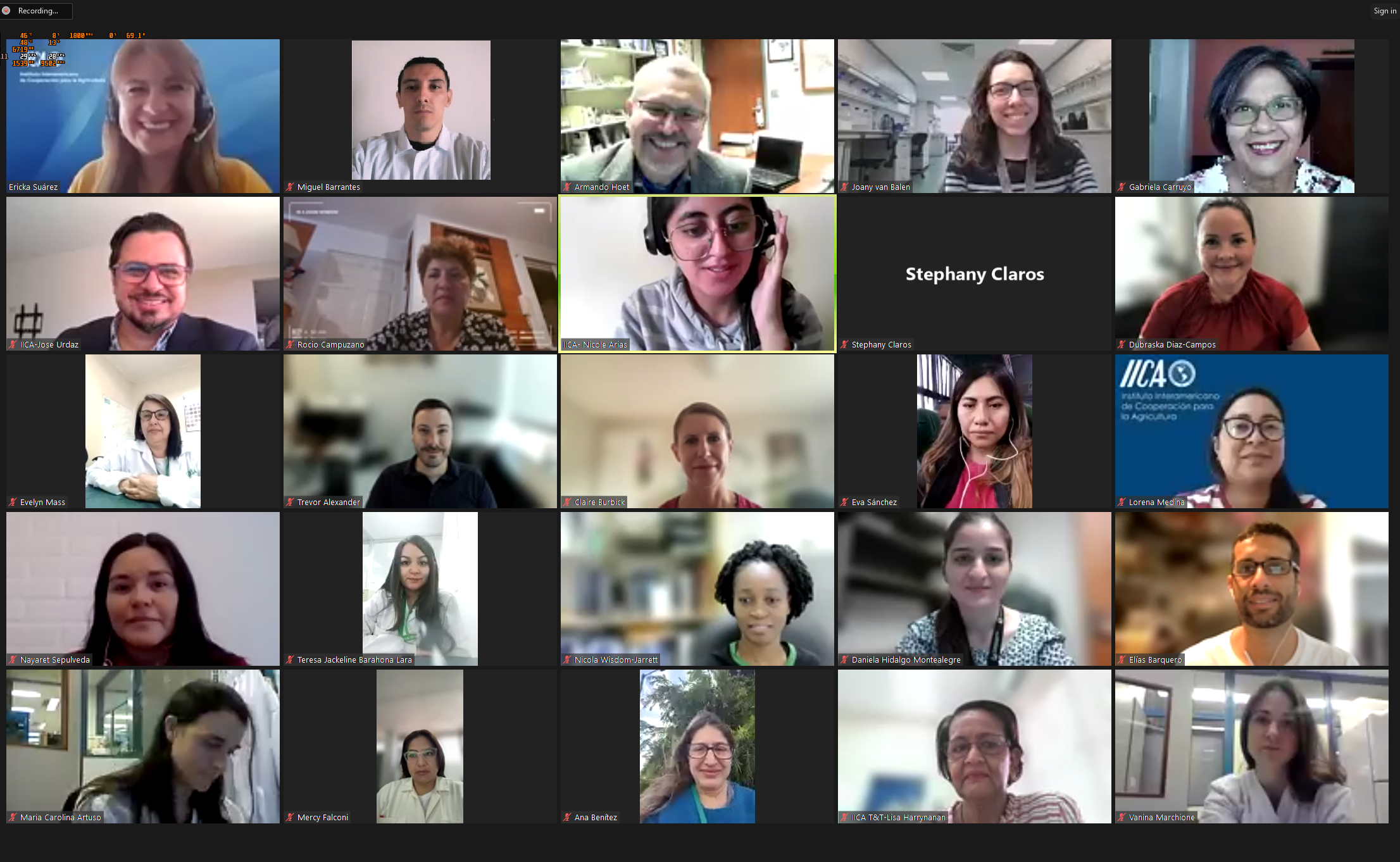With technical guidance from The Ohio State University, and under IICA’s coordination, a virtual course on Clinical and Laboratory Standards Institute (CLSI) standards was delivered with the aim of improving the monitoring of diseases that can affect food production in the region.

San Jose, 29 August 2023 (IICA). Through the e-learning platform of the Inter-American Institute for Cooperation on Agriculture (IICA), 45 laboratory technicians of veterinary services in 12 countries of the Americas expanded their knowledge of international standards for improved diagnosis and interpretation of antimicrobial resistance (AMR) results, which facilitate monitoring of diseases that could affect agrifood production systems.
Entitled “Introductory training in antimicrobial susceptibility testing (AST) using Clinical and Laboratory Standards Institute (CLSI) standards to selected Latin American and Caribbean countries”, the course was developed by experts from the Clinical and Laboratory Standards Institute (CLSI), the University of Pennsylvania and Washington State University, with technical guidance from The Ohio State University and under the coordination of IICA’s Agricultural Health, Safety and Food Quality Program (AHFS).
The six-week course addressed topics such as receipt and evaluation of samples; common AST techniques; laboratory set-up, organization and good practices; supplemental tests; and development of standard operating procedures.
The training course will allow for improving the diagnosis and interpretation of antimicrobial resistance results, as well as implementing and optimizing AMR surveillance systems in Argentina, Belize, Chile, Colombia, Costa Rica, Ecuador, El Salvador, Honduras, Jamaica, Mexico, Nicaragua and Trinidad and Tobago.
“The course has had a significant impact. This will be evident once I begin performing antimicrobial susceptibility testing in the laboratory, because I feel more confident in carrying out this task”, said Nayaret Sepúlveda of Chile’s Agriculture and Livestock Service, who was one of the trainees.
“The course will enable us to adequately interpret results and correctly utilize AST thresholds when designing and monitoring national antimicrobial resistance assessment plans throughout the agrifood chain. CLSI terminology and standards will no longer represent an obstacle in the identification of data collected by the various national programs”, added Iván Camilo Sánchez, of the National Institute of Health of Colombia.
In turn, Alvaro Obando, of Nicaragua’s Institute of Agricultural Protection and Health, highlighted the considerable impact of the training course for his country, which will now be able to launch national AMR surveillance plans.
“We currently lack data on the level of development of antimicrobial resistance in the region. However, with the CLSI standards now under our belt, we will be able to standardize AST techniques and conduct high-quality testing”, he said.
A decade mitigating and controlling AMR
Antimicrobial resistance occurs when genetic changes cause microorganisms (bacteria, fungi and viruses) to develop resistance to drugs that were previously effective in eliminating them, such as antibiotics, fungicides and antiviral drugs. It is a worldwide problem that affects human and animal health, as well as the environment, and therefore requires a comprehensive and multisectoral approach, in which the agriculture sector plays a key role.
“Antimicrobial resistance is a global issue that affects human health, animal health, countries’ economies and international trade. IICA has therefore joined the fight through epidemiological surveillance. This course was developed to contribute to that objective”, said José Urdaz, Manager of IICA’s AHFS program.
“We hope to have met countries’ expectations, and that the course will mark a turning point, as demonstrated by the technical progress of official veterinary institutions in their daily work from now on”, he added.
Éricka Calderón, who coordinates IICA’s antimicrobial resistance projects, explained that, for close to a decade, the Institute and The Ohio State University have been working to mitigate and control antimicrobial resistance through surveillance and the adequate use of antimicrobials. This has resulted in significant progress in the countries, “generating surveillance programs that monitor and diagnose the presence or absence of resistant bacteria in animal production systems and their processed products”.
“Capacity building for adequate diagnosis is one of the most valuable approaches in technical cooperation, which is why we felt the need to create the course and strengthen knowledge that will help countries build strategies to mitigate and control AMR”, added Calderón.
Armando Hoet, Director of the Veterinary Public Health Program at The Ohio State University, noted that the course offered through IICA’s e-learning platform is the first “of its kind and complexity in Latin America and the Caribbean, so it has filled a significant void” in countries of the region.
“Eighty-seven percent of the participants, who are official staff of veterinary diagnostic laboratories from 12 countries, reported that they had never received in-depth training on CLSI recommendations and standards, which are crucial to generate high-quality, accurate antimicrobial susceptibility results throughout the agrifood chain, as part of the fight against antimicrobial resistance”, Hoet concluded.
More information:
Éricka Calderón, Agricultural Health Specialist at IICA.
ericka.calderon@iica.int











